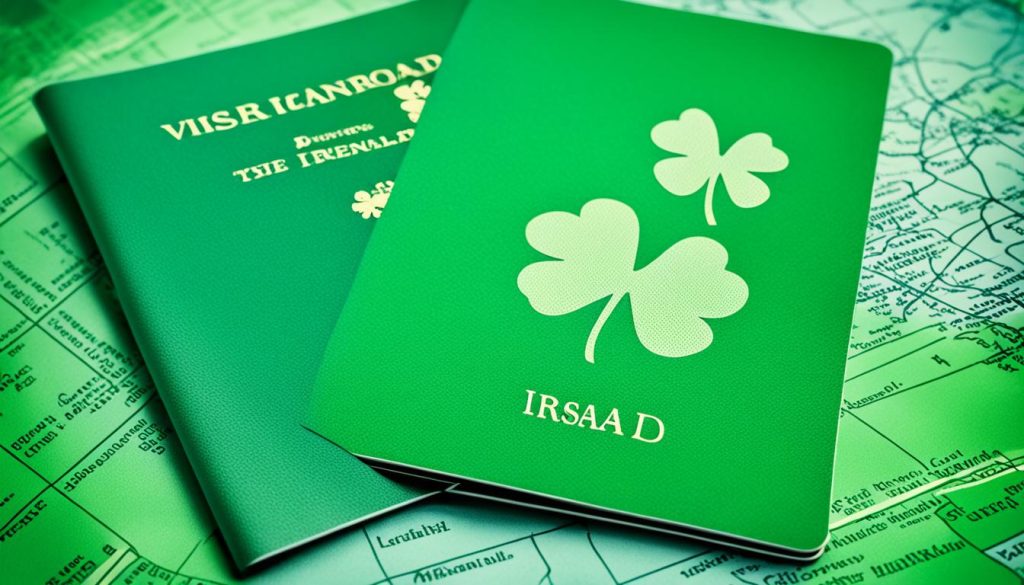When planning a trip to Ireland, it’s important to know the immigration rules. This is crucial for those not from the UK, Switzerland, or an EEA country. Making sense of Ireland’s visa requirements is the first step towards a hassle-free journey.
- Visa Requirements for Entering Ireland
- Types of Irish Visas
- Visa Waivers for UK Visa Holders
- Preclearance for Non-Visa Nationals
- Travelling with Children
- The Role of Immigration Control
- Immigration Regulations in Ireland
- Working in Ireland
- Studying in Ireland
- Permanent Residence (Stamp 5)
- Family Reunification Visas
- Irish Citizenship Through Naturalisation
- Special Rules for Ukrainian Citizens
- Re-Entry to Ireland
- Appealing a Visa Decision
- Source Links
An Irish visa is a must-have sticker on your passport or travel document. It allows you to journey to Ireland. Still, the final say on entry is with the immigration officer when you get there.
If you’re travelling with kids, each child must have their visa application accepted. Some visitors will also need to check in with Irish immigration once they arrive in the country. It’s worth noting that, as of 25 February 2022, Ukrainian people can come to Ireland without a visa.
Key Takeaways:
- Non-UK, Swiss, or EEA citizens must typically apply for an Irish visa.
- Visas serve as travel certificates but do not guarantee entry to Ireland.
- Children travelling to Ireland need their own visas.
- Some travellers may need to register with immigration authorities upon arrival.
- Ukrainian citizens do not require a visa for Ireland as of 25 February 2022.
Visa Requirements for Entering Ireland
Ireland’s visa rules might seem complex. But it’s important to know if you need a visa for your trip. Different rules apply based on your country and how long you plan to stay. Here, we explain who needs a visa for Ireland and give details for those from visa-exempt countries.
Who Needs a Visa?
In Ireland, people from many countries must get a visa before they arrive. If your country isn’t on the visa-exempt list, you’ll need to apply for a visa. The process is clear but needs to be followed carefully. Make sure you have the right documents and meet all the requirements for your visa type.
Citizens of Visa-Exempt Countries
If you’re from a visa-exempt country, you can go to Ireland without a visa. This group includes countries in the European Economic Area (EEA), Switzerland, the US, Canada, Australia, and some British nationals. But, British protected persons still need a visa. Also, some people might need preclearance if they’re planning to stay in Ireland for particular reasons.
Types of Irish Visas
When planning a trip to Ireland, knowing the different visas is important. There are short stay visas (C visas), long stay visas (D visas), and transit visas. Each is for a specific stay length and reason.
Short Stay Visas (C Visas)
A short stay, or the Ireland C visa, is for under 3 months visits. It’s for tourists, business people, and those on short courses. It makes short visits smooth and trouble-free.
Long Stay Visas (D Visas)
For stays over 3 months, the Ireland D visa is needed. It’s for study, work, or joining family in Ireland. This visa lets people stay longer legally and without problems.
Transit Visas
Some need an Irish transit visa to pass through en route to another place. It’s for transiting without entering Ireland, avoiding delays.
Knowing about these visas helps make travel to Ireland easy and fun. It matches the journey to the visa needed.
Visa Waivers for UK Visa Holders

If you have a UK short-stay visa, you can easily go to Ireland. This is because of special travel waivers. They make moving between the two countries smoother.
Short Stay Visa Waiver Programme
The Short Stay Visa Waiver Programme lets certain country nationals visit Ireland without a separate Irish visa. You need to have a valid UK short-stay visa, though. This programme makes it easier for eligible travellers to visit Ireland without much hassle.
British-Irish Visa Scheme (BIVS)
The British-Irish Visa Scheme (BIVS) is great for folks from India and China. It lets them travel to both the UK and Ireland with just one visa. If their travel papers have the correct endorsements, they don’t need an Irish visa. This shows how UK visa holders benefit from Irish visa waivers, allowing for easy travel between the countries.
Preclearance for Non-Visa Nationals
People from non-visa national Ireland looking to volunteer or live with a de facto partner need preclearance. It makes moving to Ireland smoother. Knowing when and how to apply is key for a trouble-free move.
When Preclearance is Required
Residents of non-visa national Ireland must get Irish immigration preclearance for various reasons. These include:
- Volunteering in Ireland
- Joining a de facto partner in Ireland
- Engaging in religious pursuits
- Family reunification under specific criteria
Application Process for Preclearance
The process to apply for Ireland visa preclearance has several steps. First, you need to fill in an online application. This form collects all your details.
- Create an account on the official Irish immigration portal.
- Fill out the preclearance application form, giving correct info.
- Submit your application and the needed documents.
- Pay the fee through a secure payment site.
After approval, you must register if staying in Ireland for over three months. This last step confirms your preclearance. It means you can live and do your planned activities in Ireland with ease.
Travelling with Children
When you’re planning for family travel Ireland, knowing about visas for kids is crucial. Each child needs their own Ireland visa for children, no matter the adult’s visa or country. It makes going through immigration smooth and stops any delays.
For a smooth journey, here are some tips:
- Check the special immigration with minors Ireland requirements. They can be different from adult visas.
- Collect needed documents like birth certificates, passport photos, and consent letters if only one parent is travelling.
- Apply for the visas early to avoid any last-minute processing delays.
- Make sure all your information is correct and thorough to prevent travel issues.
By following these steps, your family can have a smooth experience. When travelling to family travel Ireland with kids, being well-prepared is important. It ensures your trip is memorable and fun.
The Role of Immigration Control

As soon as you arrive in Ireland, you’re greeted by immigration control. It’s a key part of your visit. They check if everyone meets the entry rules for Ireland.
What to Expect Upon Arrival
Be ready for a check by Ireland’s border control when you get off the plane. Officers will look at your passport and other documents. This is to make sure you can legally enter and it keeps the country safe.
Documents to Present
You need to have some important documents ready. Here’s what you should bring:
- Passport
- Visa (if required)
- Proof of accommodation
- Return or onward travel ticket
- Financial evidence to support your stay
An officer decides if you can enter, even if your papers are fine. They’re making sure everything is in line with Ireland’s laws, keeping the country secure.
Immigration Regulations in Ireland
Understanding Ireland’s immigration laws means knowing the difference between short and long stays. This is important because it decides what visa you need. It also affects what you must do after getting your visa.
Short-Term vs Long-Term Stays
Short-term visits are usually under 90 days. They can be for tourism, business, or short courses. If you’re here short-term, you don’t need an Irish Residence Permit (IRP).
But if you’re staying longer for work, study, or moving, it’s different. You will need a long-term visa. Getting this visa requires showing you have enough money and a clear reason for staying.
Registration Requirements
If you’re in Ireland for over 90 days, you must register with immigration. You’ll need to get an Irish Residence Permit. This permit is very important for living here legally.
The IRP contains your personal details, like fingerprints. You must renew it sometimes. Knowing these rules helps make sure you stay in Ireland without any issues.
Working in Ireland
If you’re from outside the EEA/Switzerland and want to work in Ireland, you need the right permit. Knowing about the different permits makes getting into the Irish job market easier.
Employment Permits and Atypical Permission
To work in Ireland, you’ll need to get an employment visa. This can be through various permits or special permissions. These are key for legally securing work in the country.
Types of Employment Permits
Ireland offers different work permits suited to various roles and time periods:
- Critical Skills Employment Permit: Aimed at highly skilled jobs with a shortage of professionals in Ireland.
- General Employment Permit: Good for many job types, if they pass a test showing Ireland needs the labour.
- Intra-Company Transfer Permit: For moving employees within multinational companies to Ireland.
- Dependant/Partner/Spouse Employment Permit: Lets family members of critical skills permit holders work in Ireland.
- Contract for Services Permit: Given to foreign employees in Ireland to complete a contract.
Studying in Ireland

Starting your student journey in Ireland is exciting. To have a smooth journey, knowing about the student visa requirements in Ireland is key. It’s important to get the right educational permits too.
Student Visas
To study in Ireland, many students need to get an Ireland student visa. Whether you need one depends on where you’re from and how long you’ll stay. For stays over three months, you must get a Category D long-stay visa.
Permits for Educational Purposes
After you get your Ireland student visa, you might need more permits for your studies. These permits make sure you’re following the law. They also give you access to student resources. No matter what you’re studying, the right permits make everything easier.
Permanent Residence (Stamp 5)
Getting permanent residence in Ireland marks a key step for those wanting long-term stay. The Stamp 5 Ireland shows you’ve met the nation’s immigration rules.
Eligibility Criteria
To be eligible for Permanent residence in Ireland, you need to have lived there for at least eight years. You must also show you’re of good character, have obeyed immigration laws, and have a valid passport for the Stamp 5.
Application Process
The application for Stamp 5 Ireland is submitted to the Irish Naturalisation and Immigration Service (INIS). You must provide evidence of your residency, a clear criminal record, and that you’ve followed Irish immigration regulations. It’s vital to submit your application on time and accurately.
Benefits of Stamp 5
Stamp 5 Ireland comes with great benefits. It allows you to live in Ireland with no work or self-employment restrictions. It’s also an important step to becoming an Irish citizen, as it counts towards the naturalisation process. This status proves your commitment to making Ireland your long-term home.
Family Reunification Visas
In Ireland, the Family Reunification Visa lets non-EEA family members live with their relatives who already reside in the country. It’s important to know the rules, how to apply, and what you can do once you get there. This knowledge is key to making your application successful.
Eligibility and Application Procedures
Who can apply for a Family Reunification Visa depends on the Irish resident’s status. It’s open to families of Irish citizens, EU/EEA nationals, and those with long-term residence permits. Here’s what the process usually looks like:
- Submitting an application online through the Irish Naturalisation and Immigration Service (INIS) website
- Providing proof of relationship, status of the resident, and financial support
- Paying the application fee and going to a visa meeting, if needed
Rights and Responsibilities
Getting a family visa for Ireland means you can live there, with access to important services. These include healthcare and education, and sometimes you can work too. Yet, those with an Ireland reunification visa must follow the country’s immigration rules. They must keep their residence status up to date and tell authorities about any big changes in their lives.
Irish Citizenship Through Naturalisation

Becoming an Irish citizen through naturalisation is a big step for those wanting to call Ireland home. It’s crucial to understand what’s required for a smooth application. Here we outline the eligibility, how to apply, and the residency needed for Irish naturalisation.
Eligibility for Naturalisation
For Irish citizenship via naturalisation, applicants must be adults of good character. They need to have lived in Ireland for some time. They should plan to stay in Ireland and promise loyalty to the country.
Application Process
The application for naturalisation requires a detailed form and supporting documents. These documents prove you meet all the requirements, including time lived in Ireland and identity. After sending your application, the INIS reviews it, which might take months.
Reckonable Residence
Reckonable residence is the legal time spent living in Ireland, not counting time as a student or asylum seeker. You need at least five years of such residence in the last nine years. This includes living in Ireland for the 12 months right before applying.
Special Rules for Ukrainian Citizens
To help Ukraine during tough times, the Irish Government has made it easier for Ukrainian people. Since 25 February 2022, Ukrainians don’t need a visa to come to Ireland. This is part of Ireland’s plan to support Ukraine right now.
Thanks to new visa rules, Ukrainians find it easier to come to Ireland. It makes the travel and immigration process smoother. Many see this as Ireland showing kindness, helping those affected by hard times.
More Ukrainians are moving to Ireland because of these rules, finding safety and a warm welcome. Ukrainians in Ireland can use this chance to find refuge or get back with family here.
Ireland has made immigration simpler, showing it stands with Ukraine. It means Ukrainians can settle in easier, without worrying so much about paperwork. This shows Ireland’s commitment to help and be a friend to Ukraine.
Re-Entry to Ireland
If you’re thinking about going back to Ireland, knowing the visa rules is key. People living in Ireland who have a valid Irish Residence Permit (IRP) don’t need a special visa to come back. This makes returning very easy and hassle-free.
Re-Entry Visas for Current Residents
For those from outside the EU/EEA living in Ireland with an IRP, coming back is quite simple. You won’t need a re-entry visa, which means less paperwork and quicker travel preparation. This is a great part of Ireland’s visa rules, helping residents come back smoothly.
Multiple Entry Visas
Getting a multiple entry visa is a smart move for anyone who travels to and from Ireland often. It’s perfect for people who follow visa rules closely, allowing them to travel many times easily. Understanding Ireland’s visa policies is crucial, especially for frequent travellers.
Appealing a Visa Decision
Getting turned down for an Irish visa feels bad. Yet, there’s still hope. If you feel the refusal was unjust or misunderstood, you can appeal. Through the Ireland visa appeal, you can write to the Irish Naturalisation and Immigration Service (INIS). This is to try and reverse the refusal.
Steps to Appeal
The journey to contest the visa decision starts with a detailed appeal letter. This letter must explain why the refusal was wrong. Include any new documents or evidence not shared before. You must send this appeal within two months of the refusal. INIS will then reconsider your application.
Common Reasons for Visa Refusal
Knowing why your visa was refused helps improve your appeal. Common reasons for refusal include lack of funds, missing papers, unclear travel purpose, or security worries. Address these issues in your appeal to boost your chances in the Ireland visa appeal process.

















